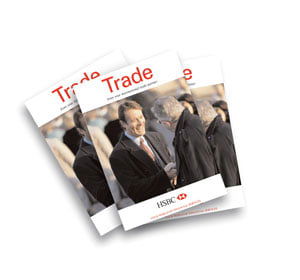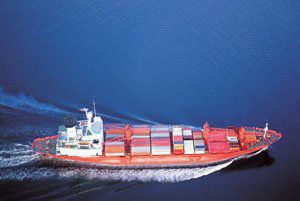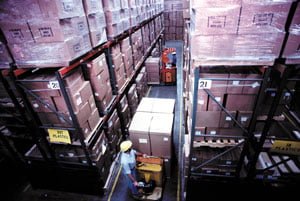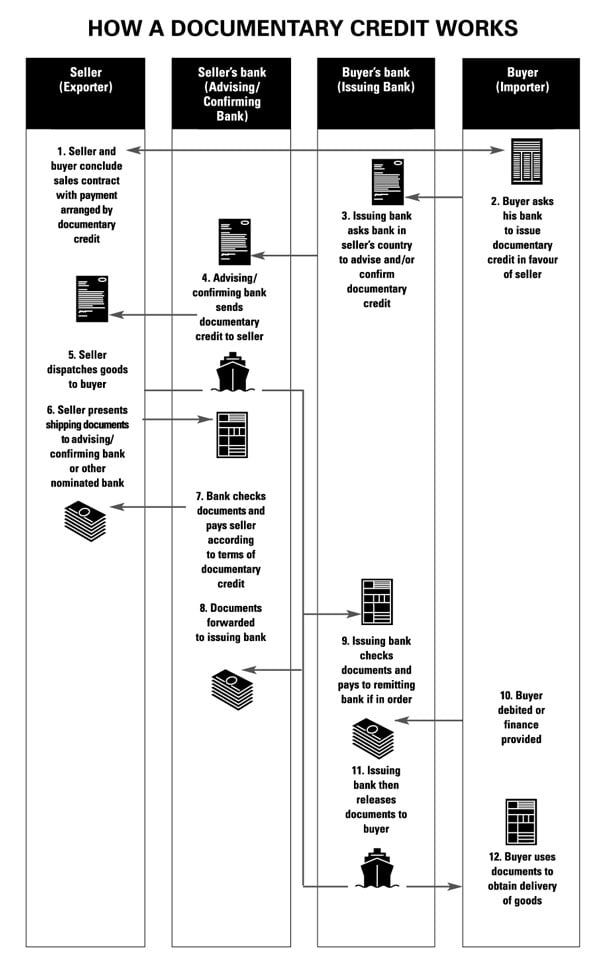
This case study focuses on the HSBC Group, which, as one of the largest banking and financial services organisations in the world, is able to develop partnerships with organisations either trading or wishing to trade overseas. Through combining its local understanding of business and commercial environments with global expertise, it is able to manage the processes for effective trading.
The HSBC Group’s international network comprises more than 5,000 offices in 79 countries and territories, operating in the Asia-Pacific region, Europe, the Americas, the Middle East and Africa. It has listings on the London, Hong Kong and New York stock exchanges.
International trade is part of everyday life. Shops, supermarkets and 21st century lifestyle provide a vast array of goods and services. Where they come from or the processes by which they arrive at the market place are rarely considered by consumers. Many consumers enjoy cars made in Germany, eat French apples, wear American jeans or trainers from the Far East and watch Hollywood blockbuster films. Before these products can be made available, numerous processes will have taken place and partnerships formed.
Imagine what it would be like to live in a country that did not trade with its neighbours. Everyday products would simply not be available. Businesses would be small because they would not be able to specialise and export their wares overseas. If the standard of living was measured by the variety of products available to consumers, it would be very poor.
Greater communication, transportation and financial flows have shrunk time and distance to create a global economy in recent years. It is easy to identify global brands that have been around for a long time such as Coca-Cola, Kodak, Nestlé, Ford and Heinz. Today, international trade is intensifying. Companies large and small continuously search for new markets. Consequently, domestic companies in the UK are increasingly facing the threat of new competitors.
There are many differences between trading in the home market and marketing products overseas. Marketing overseas often involves greater risk and a detailed understanding of many issues such as currency prices, payments, trading requirements, cultural issues, market structures and protocols. Trading overseas is not an easy process and businesses require partnerships to provide them with the expertise and support required to compete in these markets.
Benefits of international trade

Buying and selling in overseas markets offers potential for businesses to develop and expand opportunities. Some of the key benefits are:
- greater sales volumes which, providing the business is trading profitably, will translate into higher profits
- an organisation’s ability to compete in several markets can improve through observing the range of trends in quality, product development, design and packaging
- an organisation can improve its reputation with UK customers and boost staff morale
- existing products and services can be introduced into new markets, even if they have become less popular in domestic markets
- the reliance a business has on its domestic market can be reduced, and, although risks themselves cannot be overcome, they can be spread. For example, if a business does most of its trade in US Dollars, it may want to start trading with Japan to spread the exchange rate risk between the Dollar and the Yen.
A key element in developing profitable business opportunities is being put in touch with the right people and making the best connections from the outset. Specialists at HSBC understand the problems and issues when developing businesses for overseas markets.
Identifying suitable markets

International trade involves recognising that people all over the world have different needs. Many products will only suit specific countries due to different values, customs, languages, technical standards and currencies. There is rarely such a thing as a global market, but rather a number of different overseas markets. In order to pinpoint markets where a business is most likely to be successful in selling its products, a lot of groundwork has to be done and advice sought. It is also just as important to identify unsuitable markets.
The nature and type of market an organisation is considering entering is particularly important. For example, some businesses might find a small market to be a useful way of slowly expanding into international markets, while for others, only a large market could provide them with the potential to realise their ambitions.
Another factor to consider is the speed at which the market is growing. It is usually easier to take a share of an expanding market than to fight for a share of a market that is already mature or declining. The quality of competition in some markets may make entering these markets difficult. Focusing on countries with fewer competitors might be more beneficial. The degree of similarity to the UK or other markets in which a business operates can also be valuable, as it can be hard for companies to break into markets lacking common ground.
Secure trading

Catering for all of these differences can involve greater risk. Some markets may suffer from political and economic instability. In others, distribution channels may make it difficult to get products onto the shelves.
Trading with companies in North America or Europe usually means trading on ‘open account’ terms so payment is less certain. In other parts of the world, ‘documentary credits’ are a more accepted method and provide greater security of payment.
Open Account
The importer pays for the goods simply by paying money directly to the exporter after the goods have been received.Documentary Credit
An undertaking given by an importer’s bank to pay a sum of money to the exporter provided the exporter meets certain conditions contained in the documentary credit.
HSBC Trade Services
HSBC Trade Services is an important operation within the HSBC Group. Supported by electronic delivery, it provides specialist services and tailored solutions for customers involved in international trade. HSBC Trade Services provides a partnership role designed to help organisations manage the processes for effective trading in an increasingly complex trading world, using global reach and local knowledge. Its position of expertise ranks HSBC as one of the largest trade services organisations in the world within an international network of banks.
Relationship managers are the gateway to HSBC’s services for exporters. They provide access to all of HSBC’s services together with the specialist expertise required to develop trade solutions that match the needs of their clients. HSBC has a long-established local presence in many countries and territories around the world and, with the use of advanced technologies, has a truly global reach. The first stage is often making sure that the right experts in the right countries hear the needs of the business, so that connections can be made. Another service is to provide support with documentary procedures.
Import and export finance

Arranging payment to the satisfaction of both importer and exporter can be a problem. The exporter would ideally like payment in advance of shipping goods, while importers like to delay payment until goods have been received. HSBC assists both import and export customers by acting as a trusted third party.
Other than ‘open account’, there are two well-used methods of dealing with the transfer of finance – ‘collection’ and ‘documentary credit’.
With a collection, the exporter will ship the goods to the importer and will also send documents associated with the transaction to his (the exporter’s) bank. The exporter’s bank will then forward the documents to the importer’s bank with instructions to collect payment from the importer. When the importer pays – or promises to pay – his (the importer’s) bank, the documents are released to the importer, so he can collect the goods. The importer’s bank then pays the exporter’s bank, which in turn, pays the exporter.
Once the documentary credit is issued, the exporter prepares the goods for shipment. When the exporter dispatches the goods, he sends the documents relating to the goods to his bank. The importer will need these documents in order to collect the goods, but for a time the goods are under the control of the bank. The exporter’s bank pays the exporter and sends the documents to the importer’s bank, to be reimbursed. Documents move along the chain. Once the importer pays his own bank, the documents are released to him and he can then collect the goods.
To avoid confusion in these transactions, the exporter’s bank is known as the advising bank and the importer’s bank is called the issuing bank.

Electronic Data Interchange
The use of EDI is one way in which HSBC is helping its customers to manage this complex supply chain. EDI is where two or more companies in the supply chain exchange information in agreed formats electronically, so that the computers can process the data automatically. (E-mail is not the same as EDI.)
The electronic banking services system within the HSBC Group is known as Hexagon. Hexagon includes trade services, cash management, payments and information reporting.
Hexagon has a specially designed module for the transfer of electronic commercial documents. These can then be moved from a computer in one company to a computer in another. This removes the problem of reproducing documents and the possibility of errors.
EDI links both importers and exporters which brings additional benefits to HSBC’s customer supply chain system. For example, customers can raise an order for goods and, using HSBC’s system, send it to a supplier or buyer electronically.
Examples of transactions
Example 1

‘An excellent way to boost our sales’ is how a company manufacturing and exporting textile machinery for processing cotton and synthetic fibres describes HSBC Trade Services’ Insured Export Finance facility. In this business, competition comes primarily from Germany but also from Swiss, Italian and Japanese companies. This manufacturer has developed new markets in the USA, China and Asia-Pacific. With terms of payment varying, but repayment sometimes being made over periods of up to five years, the Insured Export Finance facility provides funding for credit-insured export sales to the USA. The exporter receives ten per cent in advance and 90 per cent when documents are presented (evidence of shipment), which is usually 5-6 weeks before the customer actually pays.
Example 2
A Welsh company dealing in specialist camping equipment and clothing has grown from village roots to 1600 outlets in the UK and is now attacking the European market. Being both an importer of goods from the Far East, where it has a large production programme and an exporter of finished goods to selected European markets, the company turned to HSBC Trade Services two years ago and was introduced to the Hexagon system. The company now uses Hexagon to open and manage letters of credit opened in favour of factories in the Far East, and HSBC Trade Services also provided the company with a structured import finance facility.
Example 3
A major UK domestic retailer required an international partner to assist in further automating its supply chain management. As well as providing an international trade finance facility, HSBC Trade Services introduced an electronic document delivery channel for the retailer and its suppliers. This interface with the supply chain management system enables purchase orders to be delivered electronically to international suppliers. They are automatically acknowledged and the suppliers create their own invoices and packing lists. Documents are then electronically returned to the retailer where the data can update the retailer’s management system.
Conclusion

International trade is becoming a way of life for an increasing number of businesses. As there are many business risks and uncertainties associated with trading outside domestic markets, organisations require secure partnerships.
HSBC Trade Services’ strength is to provide an understanding of the local needs of its customers, while having the global coverage to ensure it can provide solutions to business problems wherever in the world they occur.
